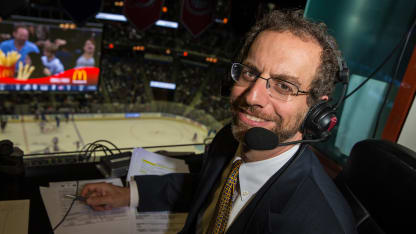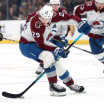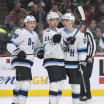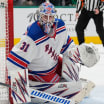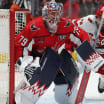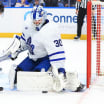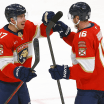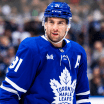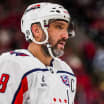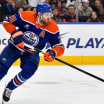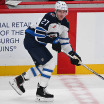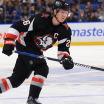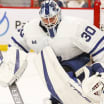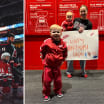In NHL.com's Q&A feature called "Sitting Down with …" we talk to key figures in the game, gaining insight into their lives on and off the ice. In this edition, we feature Dave Mishkin, who has been the radio play-by-play voice of the Tampa Bay Lightning since 2002. Mishkin’s first book, a novel called “Blind Squirrel,” is set to come out April 7.
The idea came to Dave Mishkin back in the late 2000s, a concept for a novel about a minor league hockey player with extraordinary hand-eye coordination, a player who is also dealing with the trauma of having lost both his parents when he was young.
But he couldn’t make it work then.
“I had never written a novel before,” Mishkin said. “I had never written anything close to something like this before, so I didn’t really know how to begin, so I just started. I started with what I thought would be a Chapter One and then what became Chapter Two. And I hit a brick wall.”
Frustrated, Mishkin put aside the chapter he had. He didn’t delete it, but for about 13 years it remained untouched on his computer’s hard drive. He figured that maybe he would come back to it, maybe not.
Eventually, after his wife suggested a return to the novel, post-pandemic, he picked it back up. Everything clicked in a burst of creativity and writing, culminating with the book coming out April 7, a long-awaited moment for Mishkin, followed by a launch party at the game between the Tampa Bay Lightning and Ottawa Senators on April 11, with more information on both available at BlindSquirrelNovel.com. A portion of the proceeds of the book will be donated to Tampa Bay Thrives, an organization that works to help end the stigma surrounding mental health.
In the book, the player sustains an injury, has to retire, then begins his path to recovery. It’s a novel that touches on hockey, on trauma, on mental health. It’s a novel that might just fit better in 2024 than it would have in 2009.
“Maybe it worked out that I got stuck,” he said. “All these years later, it’s certainly become a talking point within the NHL, among players, but also I think the general public.”
NHL.com talked to Mishkin about the process of writing the novel, its focus on mental health, and the Lightning’s season and postseason potential.
What is the book about?
“The name of the book is ‘Blind Squirrel.’ Noah Nicholson is a minor league hockey player, the captain of his team, who is silently struggling with his mental health. When he was 12 his parents died in a car accident, and he’s dealt with mental health issues ever since. He’s had a successful career, but then he sustains an injury and is forced to retire. It’s at that point that he’s able to begin the healing process, and the Noah at the end of the book is in a much better place than the Noah at the beginning of the book.
“So much of what we do and consume is subjective, but I believe that ‘Blind Squirrel’ is a compelling story. I believe it’s an impactful story, as it has the mental health component. I believe it’s an accessible story. There is hockey in it, but you don’t need to know much at all about hockey to be able to enjoy the story, and I wrote it intentionally to that end. It’s certainly a feel-good story. And, finally, I call it a love story. Noah meets someone, but there’s also the love between a boy and his parents and there’s the love between a captain of a team and his teammates, which I think comes through in the book. So, it turned out exactly the way I wanted it to.”
What made you pick the idea for this novel back up?
“It wasn’t until we were in the spring of 2022 -- we had come out of COVID at that point -- [when] the Lightning were playing Toronto in a first-round series and on the brink of elimination. And really, had the Lightning lost that series, it was going to be my first lengthy period of time without any projects or anything going on since 2019 when the Lightning had lost in the first round. I really didn’t have anything planned. And I said to my wife, ‘I wonder what I’m going to do this summer if the series doesn’t turn out well for the Lightning?’ And she said, ‘You can go back to that novel that you started all those years ago.’ I didn’t go back to it in that I started writing -- at first I laughed her off -- but I went back and started thinking about the story.”
How did it go differently the second time around?
“I left alone the part where I got stuck and I moved to basically Part Two of the novel, which is what does this recovery look like. I knew I wanted him to meet someone. So, who does he meet? Who is she? What’s her backstory? And I was astonished that the story came together in my mind. And so, the Lightning ended up winning that series and moving on to the Stanley Cup Final. And during that time, from the first round until the Final, I didn’t write a word, but my brain was going 100 miles a minute. All the roadblocks fell away.”
What was the writing process like?
“By the time the Lightning reached Denver, played the Avalanche in the Stanley Cup Final, I basically had the story and was able to do a chapter outline before the series began. It was during that series that I started writing it. I remember we were flying back from Game 2, and Phil [Esposito] was sitting next to me on the plane. I spent the whole flight writing. He said, ‘What are you doing?’ I said, ‘I have this idea for a book and I’m writing it.’”
How long did it take?
“From the time that I sat down to start writing until the time I finished, it took me three-and-a-half months. I’ve never experienced that level of creativity before or since and I would include the time that I spent thinking, but the thinking part preceded the three-and-a-half months of writing. So, I wrote it over the summer of 2022.”
How have you seen the acceptance of talking about mental health grow and how did it impact the book?
“I think I would have written about it whether it was getting more play or not. But yes, I think the book is coming out at a time when more and more people are talking about mental health issues and, in particular, athletes are talking about struggles they have had. So, I think the timing is probably better now than when I [initially] wrote it. The present day in the book is the early 2000s. … I needed him to be a boy in the ‘70s, I needed him to be pre-texting, I needed him to be pre-more awareness of mental health. So, it’s a dude and it’s at a time when nobody is talking about this, particularly if you’re a guy and an athlete. So, I think that fit in well with this idea that I’m the only one in the world who is dealing with this, which is a theme in the book. It’s why he keeps it secret, because he thinks he’s the only one in the world who is dealing with his specific problem.”
Moving on to the Lightning, what have you seen this season from Nikita Kucherov?
“He’s on pace, as we speak right now, to eclipse his all-time point total, for sure. And that year, 2018-19, he was named the League MVP and won the scoring title. It is unclear if he’s going to win the Hart Trophy or win the scoring title this year again, based on how some other players have done. But I think that he has elevated his game, which is very remarkable to think about because his game prior to this year was already at a very, very high level. Tangibly, he has shot the puck more -- that’s reflected in his goal total -- so there is a direct line between him shooting the puck more and the puck going in. On most nights, he has been one of the, if not the, best player on the ice for the Lightning -- and including the other team too, having watched every minute of every game he’s been in. And this is with other teams doing everything in their power to try and stop him because they understand that he is operating at a different level right now. The idea certainly would be, if you’re game planning against the Lightning, try and limit Kucherov best you can and then take your chances with the rest of the lineup, which is why he’s generating a lot of buzz as an MVP candidate.”
What are the Lightning’s odds in the Stanley Cup Playoffs?
“The opponent has a vote, too, but I think the biggest obstacle for the Lightning this year and the biggest obstacle toward any sort of sustained playoff success is keeping the puck out of their net. This isn’t reinventing the wheel -- this is true for most teams -- but they have been a below-average defensive team for most of the year. And they’ve been in the mid-20s in terms of team defense or worse most of the year. Their best hockey has come when they have done a more consistent job of keeping the puck out of the net. … But I don’t think -- and this is my own opinion -- that the goaltending has been subpar. I think it has been that the team in front of the goaltending has been too loose defensively, which is why they are in a better spot than some other teams. But they are not where the top three teams are in the Atlantic Division, even though they have the No. 1 power play in the League and they have an MVP candidate.”
How could they win?
“If they can find a way to keep the goals-against down and play a more buttoned-up defensive game, that’s with the puck and without the puck, then I think they could be a problem for any team that they see. Because they do have Kucherov, they do have [Brayden] Point, they do have [Steven] Stamkos, they do have [Victor] Hedman, they do have [Brandon] Hagel, they do have the pedigree. I think the two acquisitions at the Deadline, [Anthony] Duclair and [Matt] Dumba, those two players have made them a better team. … That’s not a guarantee that they’re going to roll right through the playoffs like they did in 2020 and 2021 and get to the Final like they did in 2022, but I think the biggest key for the Lightning in terms of down the stretch in the regular season and any kind of postseason success is how many pucks are they keeping out of their net, essentially.”
